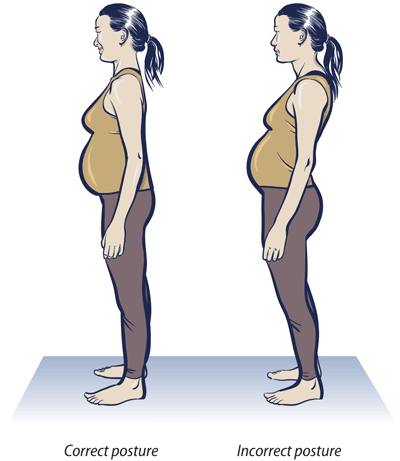Back
Understanding How Pregnancy Affects Posture
By Shannon Strauch, PTA, STMT-1 on 5/2/2024

Pregnancy is a transformative journey for a woman's body, and one of the noticeable changes that often occur is a shift in posture. This blog aims to delve into the reasons behind these posture changes during pregnancy and how women can manage them effectively.
Weight Distribution
: During pregnancy, the body undergoes significant changes in weight distribution. As the baby grows, the center of gravity shifts forward, causing the pelvis to tilt forward and the spine to curve more in the lower back. This shift in weight can lead to an exaggerated curve in the lower back, known as lumbar lordosis.Hormonal Changes
: Hormonal changes play a crucial role in pregnancy-related posture changes. Hormones like relaxin are released to relax the ligaments in the pelvis to prepare for childbirth. While this is essential for childbirth, it can also lead to increased joint laxity and instability, affecting posture.Abdominal Muscle Weakness:
As the uterus expands to accommodate the growing baby, the abdominal muscles stretch and weaken. This weakening can lead to poor posture as the muscles that support the spine and pelvis are not as strong, resulting in a swayback or "pregnancy posture."Changes in Breathing:
The growing uterus also pushes against the diaphragm, reducing lung capacity and altering breathing patterns. This can cause women to adopt a more forward-leaning posture to compensate for the decreased lung expansion, further contributing to changes in posture.Pelvic Floor Pressure:
Increased pressure on the pelvic floor due to the growing uterus can also affect posture. This pressure can lead to pelvic floor dysfunction, affecting the stability of the pelvis and contributing to postural changes.
Managing Posture Changes During Pregnancy:
Regular Exercise: Engaging in exercises that strengthen the core muscles, such as prenatal yoga or Pilates, can help support the spine and pelvis.
Proper Body Mechanics: Being mindful of how you move and lift objects can prevent strain on the back and maintain better posture.
Ergonomic Support: Using supportive pillows while sitting or sleeping can help alleviate pressure on the spine and promote better alignment.
Postural Awareness: Practicing good posture habits, such as sitting up straight and avoiding prolonged standing or sitting, can also make a difference.
Pelvic floor therapy can be incredibly beneficial during pregnancy for several reasons:
Pelvic Floor Strengthening:
Pregnancy and childbirth can weaken the pelvic floor muscles, leading to issues like urinary incontinence or pelvic organ prolapse. Pelvic floor therapy includes exercises and techniques to strengthen these muscles, improving bladder control and reducing the risk of prolapse.Postural Support:
As pregnancy alters posture, pelvic floor therapy can help address any postural changes that may contribute to pelvic floor dysfunction. Therapists can teach proper body mechanics and posture habits to reduce strain on the pelvic floor muscles.Pain Relief:
Many pregnant women experience pelvic pain or discomfort, especially in the later stages. Pelvic floor therapy can incorporate techniques to alleviate pain and improve mobility in the pelvic region, enhancing overall comfort during pregnancy.Preparation for Birth:
Pelvic floor therapy often includes education on optimal birthing positions and techniques to promote a smoother delivery. Strengthening the pelvic floor muscles can also facilitate the pushing phase of labor.Recovery Postpartum:
After childbirth, pelvic floor therapy can aid in the recovery process. It helps women regain strength and function in the pelvic floor muscles, addressing any issues that may have arisen during pregnancy or delivery.Emotional Support:
Pregnancy and postpartum can bring about emotional challenges, especially concerning changes in the body. Pelvic floor therapy provides a supportive environment where women can discuss their concerns and receive guidance on coping strategies.
Overall, pelvic floor therapy during pregnancy offers a holistic approach to women's health, addressing physical, emotional, and functional aspects to promote a healthier pregnancy, delivery, and postpartum recovery.
Read More:
Fascial Counterstrain of the Musculoskeletal System By Shannon Strauch, PTA, STMT-1 on 10/21/2024 How treating cartilage and fascia can help reduce joint pain and improve organ function The Impact of Long-Distance Cycling on the Pelvic Floor: Pudendal Nerve and Pelvic Dysfunction By Dr. Christine Martirez PT, DPT on 10/18/2024 Learn how long distance cycling can impact the pelvic floor
Are you ready to live pain free?
Request An Appointment